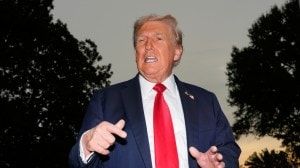LS polls to begin on September 4
NEW DELHI, JULY 11: General elections for the 13th Lok Sabha will be held in five phases starting from September 4, the Election Commissi...

NEW DELHI, JULY 11: General elections for the 13th Lok Sabha will be held in five phases starting from September 4, the Election Commission announced today.
Polling in Maharashtra will be held on September 4 and 11. Voting in Mumbai’s six constituencies will take place on September 11.
The Commission while announcing the election schedule, said polls to the 543 Parliamentary constituencies are to be held are 11, 17 and 24 September and October 1. State Assembly elections in Andhra Pradesh, Sikkim and Karnataka would be held simultaneously with the Lok Sabha polls in these states.
With the announcement of the poll schedule, the model code of conduct for political parties comes into immediate effect, Chief Election Commissioner M S Gill said.
This means state governments can no longer make any policy changes which could be construed as influencing public opinion, or effect the transfer of officials from now on till the poll process gets over.
Counting of votes would be spread over October 5 and 6 andthe results would be handed over to the President by October 8, allowing a few days short of a fortnight before the October 21 deadline for the process of government formation.
Parliamentary elections in the country are usually spread over three or at the most four phases. This time round, the involvement of the armed forces in Kargil and the deployment of paramilitary forces in Jammu and Kashmir, has created an extraordinary situation, necessitating the five-phased polling.
The nearly week-long gaps between subsequent polling days would allow for the movement of security and paramilitary forces to different parts of the country for election duty. Additionally, for the first time NCC cadets too would be put on election duty.
Elections would be held in Jammu and Kashmir at the same time as the rest of the country, though the polling would be spread over three days, with two constituencies going to the polls in each phase. Similarly, in larger states like Uttar Pradesh, Andhra Pradesh, Bihar, and MadhyaPradesh, there will be three days of polling. And, as in Maharashtra, polls in Karnataka, Manipur, Orissa, Rajasthan and Tamil Nadu will be held on two days. All other states and Union Territories will have one-day polls.
Along with the model code of conduct governing political parties, Gill also announced that the Commission would not register any new political party till the poll process is over.
“Much like earthworms in the monsoons, political parties have a tendency to split into two and get a new life. Well they will have to wait till the next elections, since we will not be registering any new political party till the polls are over,” said Gill. The notification for the September 4 poll will be issued on August 11 and the last date for filing nominations will be August 18. Scrutiny will be done the next day and the last date for withdrawal of candidatures is August 21.
Electronic voting machines (EVMs) will be deployed in 46 Parliamentary constituencies in 17 states and UTs. Over 100,000 EVMswould be set up in some 65,000 polling stations, in the most extensive use yet of the machines.
Gill, along with his colleagues G V G Krishnamurti and J M Lyngdoh, have spent much of the last few months preparing for the polls. With a virtual war on at the border in Kargil, and the monsoon season in full swing in many parts of the country, the Commission has held consultations with different sections of the political spectrum and the scientific establishment to circumvent the fallout of the armed conflict as well as the vagaries of the weather.
The Commission held two rounds of meeting with political parties and perhaps for the first time, sought inputs from the Prime Minister to get the government’s assessment of the situation in Kargil. As in the past general electons, political parties will be allowed free time on government-owned radio and television stations, the schedules for which will be announced shortly.



- 01
- 02
- 03
- 04
- 05



























